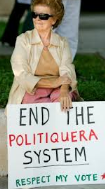Politiqueras’ a fixture in Rio Grande Valley Elections
 Texas Insider Report: AUSTIN, Texas – Two Rio Grande Valley “politiqueras” were questioned, and three have been arrested by the FBI after they were recruited by candidates to pay people to vote. According to the FBI agent who investigated the two women, a “politiquera” is a person who is hired by a candidate to bring in votes by paying voters. It is against federal law to pay people to vote and to accept payment to recruit others to vote.
Texas Insider Report: AUSTIN, Texas – Two Rio Grande Valley “politiqueras” were questioned, and three have been arrested by the FBI after they were recruited by candidates to pay people to vote. According to the FBI agent who investigated the two women, a “politiquera” is a person who is hired by a candidate to bring in votes by paying voters. It is against federal law to pay people to vote and to accept payment to recruit others to vote.
Ms. Gonzalez, Ms. Escamilla and the third woman, Diana Castaneda, said the candidates and their campaign managers would give them the cash and instruct them to use it to pay voters in the 2012 primary and general elections, the F.B.I. said in court documents. The three women worked for several candidates running for seats on the board of the Donna Independent School District, though court documents do not identify any candidates or campaign managers.
No candidates have been arrested, although the investigation continues in an area that, unlike most of Texas, is overwhelmingly Democratic.
 Days after the three women were arrested in December, one of the four Donna school board members who won re-election in 2012 — Alfredo Lugo (right), the Donna I.S.D.’s Board’s President and a former administrator at a nearby school district — committed suicide at his home.
Days after the three women were arrested in December, one of the four Donna school board members who won re-election in 2012 — Alfredo Lugo (right), the Donna I.S.D.’s Board’s President and a former administrator at a nearby school district — committed suicide at his home.
Officials have declined to talk about the motive, and a spokeswoman for the F.B.I. said she could not comment on whether Mr. Lugo had been a focus of the investigation.
In the Rio Grande Valley town of Donna, Texas, where trailer parks and weedy lots eight miles from the Mexico border, people call them runners or politiqueras — the campaign workers who use their network of relatives and friends to deliver votes for their candidates. They travel around town with binders stuffed with the names and addresses of registered voters, driving residents to and from the polls and urging those they bump into at the grocery store to support their candidates.
Despite rumors that some politiqueras went over the line in encouraging voters, the tradition continued in Donna and other border towns and cities, and campaigns for nearly every local office or seat have paid politiqueras to turn out the vote in contested races.
“Until we have candidates who pay for this service who go to jail, they’ll keep paying for votes,” said Mary Helen Flores, the founder of Citizens Against Voter Abuse, in Cameron County, which includes Brownsville.
“It’s infuriating that we’re at this point. The voter apathy here stems from the knowledge that votes are paid for.”
But in recent weeks, the suicide of the school board president and accusations of vote buying against three politiqueras, have rocked the system. The charges may threaten the existence of politiqueras in Donna,  an impoverished community of 16,000, where politics and jobs are inseparable.
an impoverished community of 16,000, where politics and jobs are inseparable.
The school system is the largest employer, and city government is the second largest; local politics rivals high school football as a favored pastime.
The three alleged “politiqueras,” working in the 2012 elections in Donna, were arrested by F.B.I. agents in December and accused of giving residents cash, drugs, beer and cigarettes in exchange for their votes. Two of the women, Guadalupe Escamilla and Rebecca Gonzalez, face up to five years in prison, and could be fined up to $10,000.
According to court documents, the typical payment to a voter was $10, a sign of the extreme poverty in the Rio Grande Valley, which is home to some of the poorest counties in America. Two of the three women — Rebecca Gonzalez and Guadalupe Escamilla — are accused of paying some voters as little as $3 for each of their votes.
One voter was given a pack of cigarettes. Others were taken to buy drugs after they received cash for voting for a politiquera’s candidate.
The investigation alleges that the two worked as “politiqueras” during the 2012 primary election and the general election. During the general election, federal candidates were on the ballot.
After the arrests, politiqueras have become a tricky issue for many of the elected officials in the Rio Grande Valley. Some officials are reluctant to discuss their past involvement with politiqueras, or they say their campaign managers were responsible for hiring them.
Other politiqueras have been accused of various forms of voter fraud over the years — including acquiring and filling out the mail-in ballots of elderly or disabled voters — but the arrests were one of the first times that politiqueras were accused of paying cash directly to voters.
Last year, Sonia Leticia Solis, a politiquera in the Rio Grande Valley city of Brownsville, pleaded guilty to voting more than once in a 2012 primary runoff, by obtaining mail-in ballots using forged absentee- voter applications and casting five votes.
voter applications and casting five votes.
Guadalupe Escamilla: Escamilla allegedly told an FBI agent that she was working as a “politiqueras” for candidates running for school board in Donna. According to court documents obtained by Action 4 News, Escamilla was being paid by two candidates to get people to vote for them.
She was instructed by the candidates to pay any voter that asked to be paid for their vote. Documents alleged that Escamilla paid the voters between $3 and $10 for their vote, and gave some of them food and cigarettes.
Witnesses were interviewed by the FBI and said Gonzalez paid them to vote for specific candidates during the 2012 general election.
Rebecca Gonzalez: Gonzalez told the FBI she was a “politiquera” for candidates who were running in the 2012 primary election and candidates who were up for seats on the school board in Donna, Texas.
She allegedly told agents she was paid $40 on multiple occasions for her work as a “politiquera” and paid others $5 to $10 for them to vote.
Possible punishment: Escamilla and Gonzalez appeared before Magistrate Judge Dorina Ramos recently for a detention hearing. They are currently in custody of the U.S. Marshals.
They cannot travel outside of Hidalgo County, cannot carry weapons, and cannot work for political candidates or be involved in elections.























